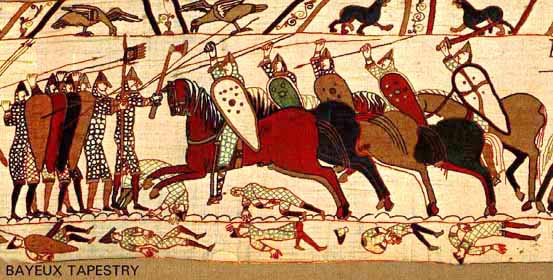Norman Place Names
The Norman conquest of Britain in the 11th Century resulted in a number of significant changes, but the impact on place names is potentially one of the most noticeable today.
In contrast to many of the other groups and tribes who ventured into Britain, the Normans mainly chose to alter place names based purely on their dislike of them, or on the beauty of the local area.
Nottingham, for example, had long been known as ‘Snottingham’, which meant ‘the settlement of Snot’. However, the Normans were unhappy with the use of the 's' as it was difficult to pronounce, so this was dropped from the name. Cambridge also has origins in Norman times, and was known as ‘Grantbridge’ before they arrived.
Names that were disliked by the Normans included Fulepet in Essex, which meant ‘Filthy Hole’ and was changed to Beaumont. Merdegrave in Leicestershire was also changed, becoming Belgrave.
‘Beau’ or ‘bel’ were commonly used as a prefix in areas considered beautiful by the Normans and this was the case in Beaulieu in Hampshire, which means ‘fair place’.
Meanwhile, in Yorkshire, the Normans changed the name of Pomfret to Pontefract, which was closer to their word for ‘bridge’.

The names of monasteries from the Normans’ homeland of Normandy were also used to name places in England. This was the case in Yorkshire where an abbey was named Rievaulx or ‘the valley of the River Rye’. Similarly, Charterhouse on Mendip in Somerset was named after a monastic house in Chartreuse.
The Feudal system was another influence on Norman place names, with many places given the names of prominent local families. Many families chose to add their names to local areas as a result of William I ’s decision to reward those loyal to him with land.
This occurred frequently around Britain and commonly led to place names that combined French family names and the original place name with Anglo-Saxon, Celtic or Roman roots. Ashby-de-la-Zouch is one example, with ‘de la’ reflecting the French influence while ‘Ashby’ would have been the name of a family from a previous area. The new Norman family would then have added their name to the end, which was ‘Zuche’.
See also:
Norman Place Names in England
Viking Place Names
The Origin of Place Names
The History of County Names
MLA Citation/Reference
"Norman Place Names". HistoryLearning.com. 2026. Web.
